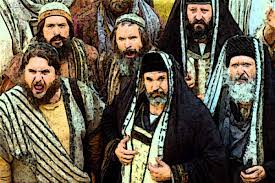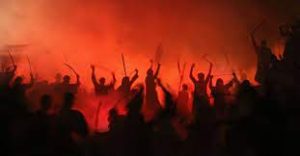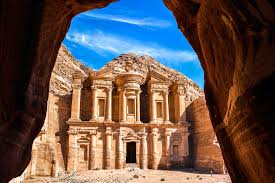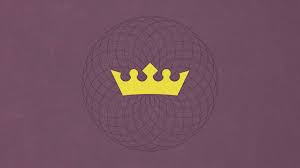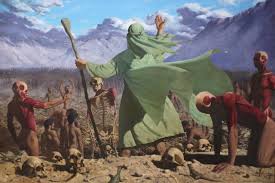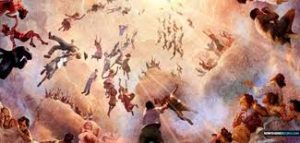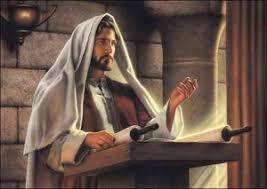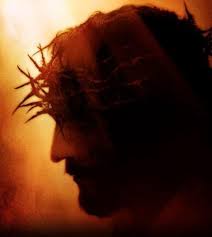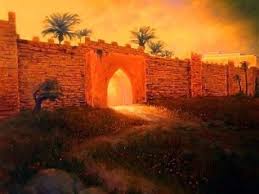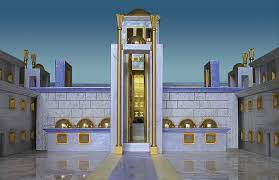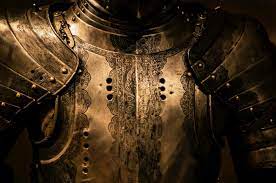Kj – In All Their Distresses He Too Was Distressed, and the Angel Saved Them 63: 7-14
In All Their Distresses He Too Was Distressed,
and the Angel of His Presence Saved Them
63: 7-14
In all their distress He to was distressed, and the Angel of His presence saved them DIG: What are the many good things God has done for the house of Isra’el in the past? What do these verses express about God’s relationship to Israel? What might Isaiah mean in 63:10 (see Psalm 78:17-22)?
REFLECT: What is the “exodus experience” that you fondly recall in your life when it was clear that the LORD was working in you? How do you feel now when times of spiritual emptiness occur? Does it encourage or discourage you to recall the past? Why?
These verses contain Isra’el’s prayer at the end of the Great Tribulation that brings about the Second Coming of Christ. The actual words of this prayer are found in four key passages of Scripture, first, in Psalm 79, secondly in Psalm 80, thirdly in Isaiah 53:1-9, and lastly here. Here the believing remnant, at the end of the Great Tribulation, looks back on God’s past dealings with Isra’el and His extension of His mercies to them.
God’s dealings with Isra’el have never been on the basis of merit, but always on the basis of His compassion and many kindnesses. Here the believing remnant remembers back and says they will tell of the kindness of ADONAI (God the Father), the deeds for which He is to be praised, according to all the LORD has done for us – yes, the many good things He has done for the house of Isra’el, according to His compassion and many kindnesses (63:7). Kindnesses is the plural of chesed, meaning God’s pledged love for His people; here plural, to intensify and amplify, a love that never changes and contains every aspect of true love. The fourth example of the Trinity of the Godhead in the TaNaKh is found in the context of this passage that deals with a summary of the Exodus. The other three examples are found in 42:1, 48:12-16 (this is the clearest example) and 61:1. Within the context of this passage, only three Persons are mentioned.
In love ADONAI identifies with His people. He said: Surely they are My people, children who will be true to Me. Love cannot be seen to be love until it does something for the loved one. And here, God loved not merely in His heart or words, but in action. So He became their Savior (63:8). When the LORD entered into a covenant relationship with Isra’el, His hope was that because they were His people, they would be true to Him. And because He had hoped that Isra’el would be true children, He became their Savior. The means by which He did this was to bring them out of Egyptian bondage.
Isaiah describes what it was like for God when Isra’el was in bondage to the Egyptians. In all their distress He too was distressed. ADONAI Himself participates in the sufferings of His people. And the Angel of His presence (God the Son) saved them (63:9a). A second Person is mentioned here. Earlier in the TaNaKh this angel was called the Angel of the LORD. And whenever this expression is used it means the Second Person of the Trinity, Jesus Christ.

This Person was very active in the Exodus and is mentioned a number of times. In Exodus 3:1-5 this angel was responsible for the calling of Moses. In Exodus 14:19 it was this angel who separated the Jewish army from the Egyptian army all night long with the pillar of cloud. This brought light for the Jewish army and darkness for the Egyptian army and prevented the Egyptian army from attacking that night. In Exodus 23:20-23 we are told that this angel was responsible for bringing Isra’el into the Promised Land. Interestingly, God told Moses: Do not rebel against Him; He will not forgive your rebellion, since My Name is in Him. Therefore, He cannot be a common angel because He has the power to forgive sins. He is also mentioned in Exodus 32:34 and 33:1-2 regarding His responsibilities in bringing Isra’el into the Promised Land. His presence is said to be in Isra’el’s camp (Exodus 33:14-15). In His love and mercy He redeemed them (see the commentary on Exodus, to see link click Bz – Redemption); He lifted them up and carried them all the days of old (63:9b). This Angel of His presence is the same as the Angel of the LORD, who has the name of ADONAI Himself. Notice in 63:9 that it was this Angel who was responsible for saving them and for redeeming them not on merit, but on the basis of His love and mercy.
But how did Isra’el respond? Was God’s hope in 63:8 fulfilled? No. For even in the days of the wilderness wanderings they rebelled and grieved His Ruach (63:10a). The Hebrew is emphatic; they all rebelled against Him. A third Personality is the Ruach Ha’Kodesh (The Spirit of God) mentioned three different times: First: Yet they rebelled and grieved His Ruach. Second: Where is He who set His Ruach among them (63:11b)? And third: Like cattle that go down to the plain, they were given rest by the Ruach Ha’Kodesh (63: 14a). In this passage, the three personalities are clearly in view. There are not less than three, and there are not more than three. However, in Jewish theology the Ruach ha-Kodesh is viewed as some sort of force from God. How can we tell from this verse that He is dealing with someone who must have a personality? Because He is able to be grieved. You cannot grieve a force. When they grieved His Ruach, the result was that He turned on them and He became their enemy and He Himself fought against them (63:10b). Isra’el’s rebellion turned God from friend into foe (James 4:4).
Why did God turn and become their enemy, and fight against them? Does that sound like what a loving God would do (see 34:2)? In Joshua we learn when God declares something devoted to destruction (Joshua 6:18), we must obey His wishes and have no part in it. But if we, like Achan (Joshua 7:1-26), touch, become one with, partake of, that which is devoted to destruction, then we become devoted to destruction. Stated another way, if we reject the sacrifice, we become the sacrifice.
The Israelites at the end of the end of the Great Tribulation find themselves hunted down to be slaughtered by the antichrist and the world. They will find themselves in desperate straits and begin to reflect on their glorious past. Then His people recalled the days of old, the days of Moses and His people (63:11a). It will be as if they are asking, “ADONAI, are you still in the miracle business? Are you still the One who did all those glorious things in the past?” They ask a series of questions:
First: Where is He who brought us through the Red Sea and divided the waters before us to gain for Himself everlasting renown (see the commentary on Exodus Ci – The Waters Were Divided and the Israelites Went Through the Sea on Dry Land) with Moses, the shepherd of His flock, leading the way (63:11b, 12b-13a)? Could the LORD who had once provided a Moses for His people provide still another through the house of David as He had promised (9:7, 11:1, 32:1, 55:3-4)?
Second: Where is He who set His Ruach among them (63:11b) (Numbers 11:24-30)? The Bible teaches that God the Father put His Ruach among the nation of Isra’el, as well as the Angel of His Presence. Therefore, the entire Trinity, God the Father, the Angel of His Presence, and the Ruach Ha’Kodesh, was responsible for the Exodus. Could Isra’el yet again have Spirit-filled leadership (59:21)?
Third: Who sent His glorious arm (the overwhelming might of God) of power to be at Moses’ right hand (63:12a)? If the arm of the LORD was present with Moses before Pharaoh, surely the same glorious arm will be present again in the power of the Spirit of God at the end of the Great Tribulation.
Like a horse in open country, they did not stumble; like cattle that go down to the plain, they were given rest by the Ruach Ha’Kodesh (63:13b-14a). Being freed from Egypt was like giving a horse free rein in open country or like letting cattle graze on a wide plain. As God gave them rest and guidance, His reputation was made known. This is how you guided your people to make for you a glorious name (63:14b). The implication is that because ADONAI demonstrated His hesed for Isra’el in the past, and had done all those wonderful things to glorify His name, could He not do so again. Of course He could, and on that basis there will be hope while they wait for the blessed hope – the glorious appearing of their great God and Savior, Yeshua the Messiah (Titus 2:13).
So the believing remnant, being in the city of Bozrah, surrounded by all the armies of the world gathered against them, suddenly begin to realize that the reason for all the problems that the Jews have faced over the centuries is a result of their rejection of the Messiah. As a result, they begin praying this penitential prayer, which will bring about the Second Coming.



